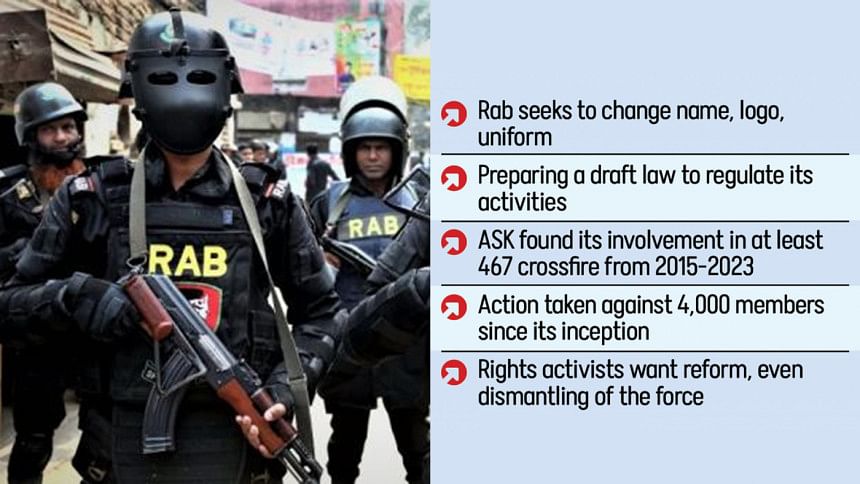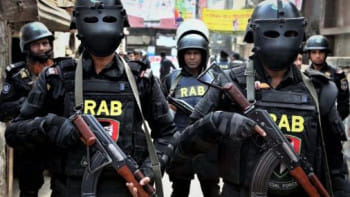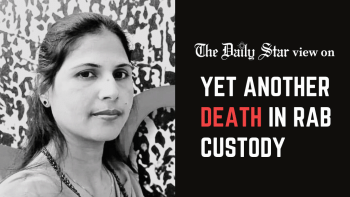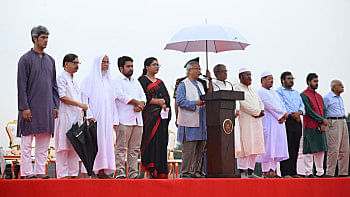Rab wants to shed its dark past

Since its formation nearly two decades ago to curb organised crime and terrorism, the Rapid Action Battalion (Rab) has been dogged by serious allegations of human rights violations. Rights activists and critics accused it of morphing into a "government death squad" that operated with impunity.
From the infamous seven-murder case in Narayanganj to the killing of Cox's Bazar municipality councillor Akramul Haque in a so-called gunfight, the force has earned quite a notoriety, eventually inviting US sanctions on its top officials in 2021.
Over the last 15 years, the specialised crime busting unit became a household name for alleged extrajudicial killings, enforced disappearances and torture of opposition political figures and government critics. During this period, numerous reports from international rights bodies detailed Rab's rights abuse, including extrajudicial murder by some of its trigger-happy members.
Some of them could even be hired by willing parties, as proven in court in the Narayanganj seven-murder case.
For years, rights organisations from home and abroad called for its reform, and the call intensified after Sheikh Hasina's fall on August 5 in the face of a mass uprising.
Against this backdrop, Rab is planning to change its name, logo and uniform and is drafting a new law to regulate its operations. Currently, there is no separate law for the force, and it operates under the police ordinance.
"We have taken steps to reform the force, including changing its name, rules and dress," AKM Shahidur Rahman, director general of Rab, told The Daily Star recently.
"We have already made a draft for changing the name and dress. We have also taken steps to make a new law for the force, which is in the drafting stage," he said.
Some rights activists, however, call for dismantling the force.
"Rab should be abolished because there is no need for encounter or extrajudicial killing. Police have three to four departments, and are enough to ensure peace," said ZI Khan Panna, a noted Supreme Court lawyer.
Rights activist Nur Khan Liton supports him.
"In my opinion as a rights activist, the force should be dismantled, and I have said this in the past as well," he said.
Liton, also a member of Enforced Disappearance Enquiry Commission, said, "Their [Rab] actions are beyond imagination. After the seven murders in Narayanganj, there should not be any sympathy for them."
The Enforced Disappearance Enquiry Commission was formed on August 28 by the interim government. So far, the Commission received 172 complaints -- the highest against any force -- of enforced disappearance linked to Rab.
As of October 31, the five-member Commission received some 1,600 complaints. Of them, the Commission scrutinised 400 complaints and interviewed 140 people.
The Commission was formed to identify the victims of enforced disappearance by intelligence and law enforcement agencies from January 1, 2010 to August 5, 2024.
Sharing the findings of the Commission with this newspaper, Nur Khan said, "We have found a diary inside a cell operated by the Rab. The cell measures just 3.5 feet by 4 feet… there was no source of light, except a small peephole, and no sanitation system except an open drain, forcing the detainee to perform all basic functions there."
The detainees were able to identify the beginning of a new day when they were provided a piece of bread for breakfast, he said.
"We have found a countdown on the cell's wall till 180 to 190 days… a feeling for families that reads 'I love my family'. Keeping victims in such unbearable conditions is a serious issue of torture," he added.
According to rights body Ain o Salish Kendra, Rab was involved in at least 467 crossfires between 2015 and 2023.
Rab was founded on March 26, 2004, during the BNP government, with members from eight forces, including the police, army, navy and air force.
The force was initially praised for its swift operations against organised crime and militancy.
The force now has 15 battalions across the country, operating under a director general, who is a police officer of additional inspector general rank.
Tawohidul Haque, associate professor at Dhaka University's Institute of Social Welfare and Research, said Rab is not solely responsible for its controversial role, and that it has some positive contributions in maintaining law and order.
"It also depends on how those in the government, who are in charge, have used the force," he told The Daily Star.
He also called for an impartial investigation and subsequent legal actions for any wrongdoing by its members, including for enforced disappearances and extrajudicial killings.
DRAFT LAW
The draft of the new law seeks to ensure accountability of the force in line with the constitution, existing criminal laws and principles of universal human rights.
Management and supervision of administrative and operational activities, recruitment, posting and discipline in the force will also be regulated by this law, Rab officials said.
The law will also specify statutory powers of preventive measures, arrest of the accused and investigation of offences under the jurisdiction of Rab.
Speaking on condition of anonymity, a top Rab official said that in response to the 2021 US sanctions, efforts are already underway to train their members on human rights.
"A counter-intelligence approach is used to prevent Rab members from engaging in unlawful activities. In cases where Rab members are found involved in such activities, appropriate actions are taken through the internal investigation cell," the official added.
Another official of the Rab Headquarters, requesting anonymity, said, "We have taken actions against 4,000 members of the force since its inception for their involvement in different crimes like seven murders in Narayanganj."
Citing their own data, the officials said they arrested 1,460 murder and rape suspects from January 1 to October 31 this year. During the same period, 617 people were arrested for robbery, 680 for mugging, 500 for kidnapping, 248 for cheating and 35 for human trafficking.
Since its inception, Rab arrested some 6,531 murder and rape suspects. Additionally, 3,783 were arrested for robbery, 11,855 for mugging, 5,628 for kidnapping, 7,641 for cheating and 1,802 for human trafficking, according to Rab data.

 For all latest news, follow The Daily Star's Google News channel.
For all latest news, follow The Daily Star's Google News channel. 









Comments